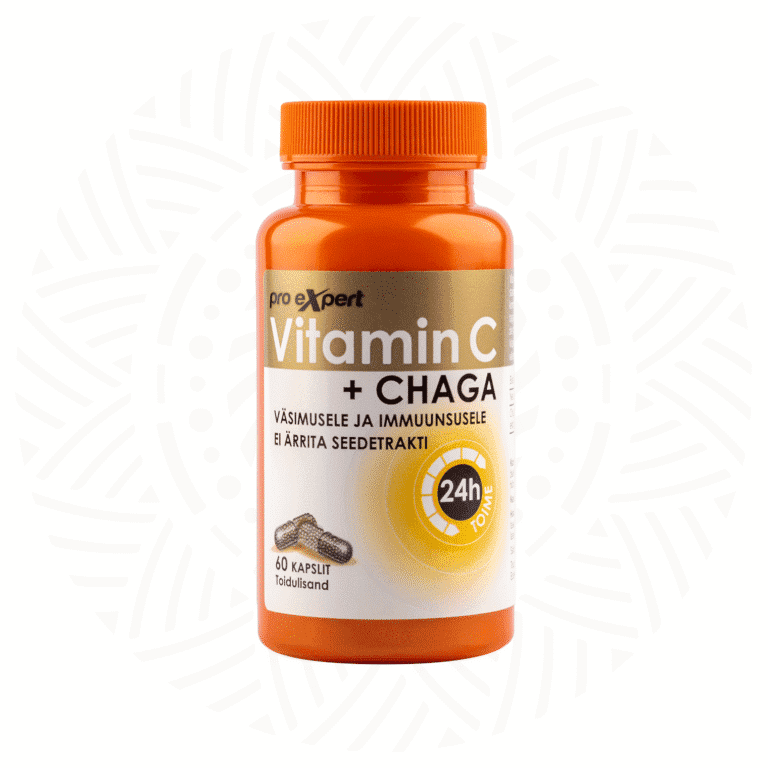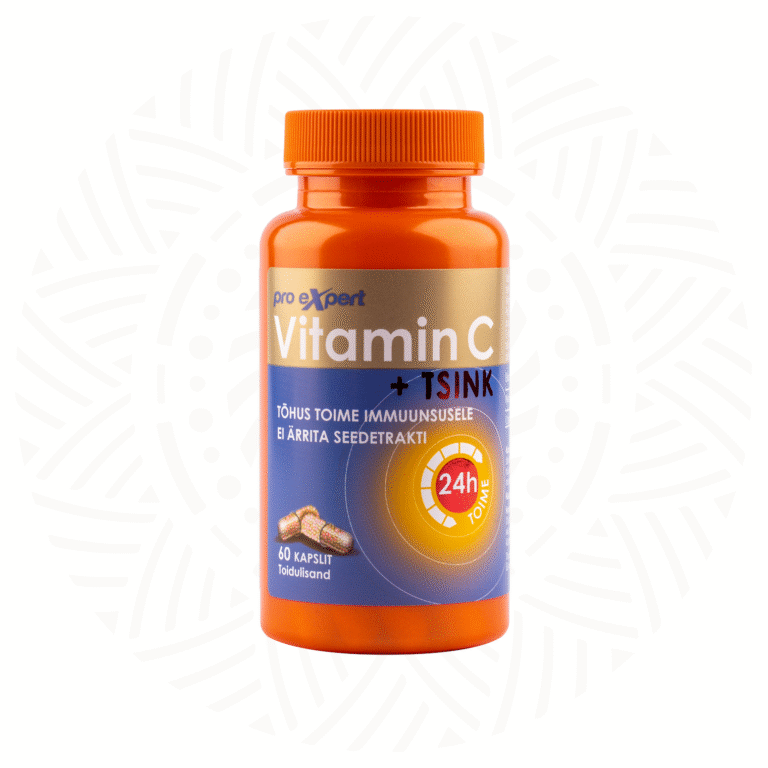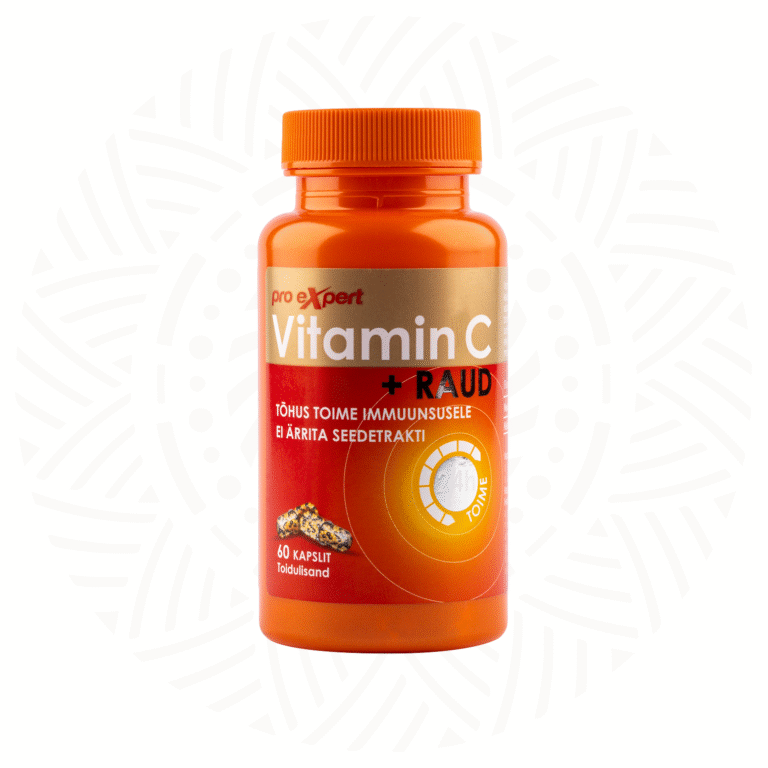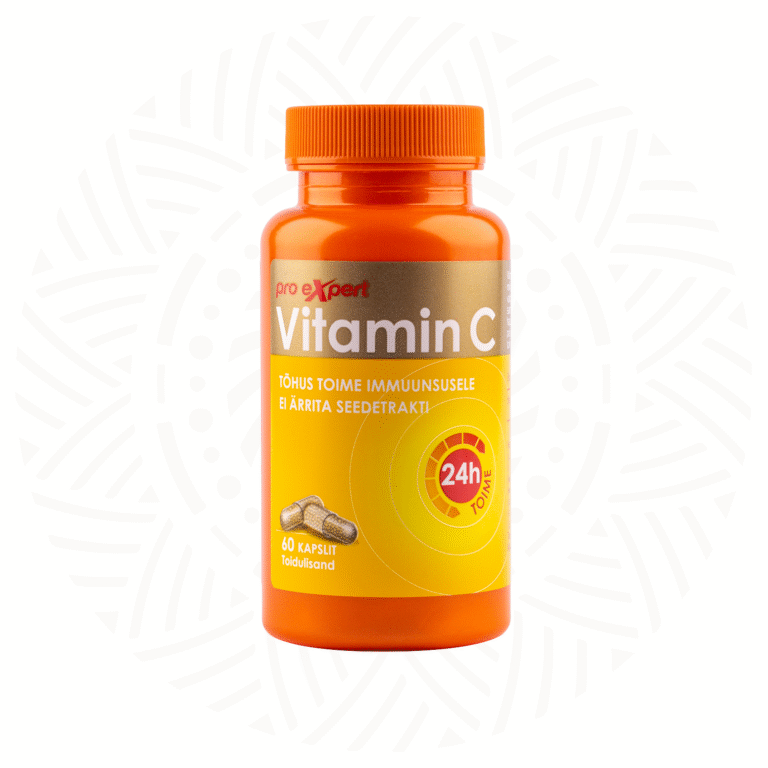Vitamin C is one of the most well-known vitamins that plays an important role in the prevention of both viruses and other diseases. Everything seems so simple – you take a supplement from the bottle and your health improves! But did you know that the timing of taking Vitamin C and several other factors can increase or even decrease its effectiveness?
If you are looking for high-quality Vitamin C, then read on to find out how and which Vitamin C to take to maximize its benefits for your health?
How much Vitamin C to take?
The daily amount of Vitamin C mainly depends on a person’s lifestyle and health condition. The daily need for Vitamin C in a healthy adult is 60 – 100 mg. The daily Vitamin C requirement for children and teenagers is 40 – 65 mg. Keep in mind that these doses only help prevent scurvy.
To get the full benefit of Vitamin C, higher doses are required daily. In case of severe Vitamin C deficiency, up to 1000 mg can be taken per day, but not for longer than 10 days. However, it is important to note that 1000 mg of Vitamin C does not get absorbed by the body all at once and as a water-soluble vitamin, it is simply excreted through urine.
For effective Vitamin C absorption, it is best to take 200 mg doses up to five times a day.
The benefits of Vitamin C lie in the fact that it is necessary for:
- the development and function of skin, gums, capillaries, teeth, and bones
- normal wound healing
- boosting the body’s resistance to diseases
- relieving spring fatigue and stress
- increasing the absorption of non-heme (i.e., plant-based) iron.
Who needs more Vitamin C?
The absorption of Vitamin C is reduced and the need for it is increased in the following people:
- Smokers
- Pregnant and breastfeeding mothers
- Women taking contraceptive pills
- People with digestive problems
- People taking allergy medications
How to take Vitamin C?
Vitamin C stays in the bloodstream for only a few hours, which is why it needs to be taken in divided doses. Only 200 mg of Vitamin C is absorbed at once by the body, and larger single doses are simply excreted through urine. Therefore, to maximize its benefits, you should take 200 mg of Vitamin C five times a day. True, this can be a bit inconvenient!
If you prefer convenience, choose Vitamin C that is extended-release or prolonged-release.
Why choose extended-release Vitamin C?
Extended-release Vitamin C is gradually released into the body and provides even and long-lasting effects throughout the day. They are easy and convenient to use since prolonged-release Vitamin C is taken only once a day.
When to take Vitamin C?
Vitamin C belongs to the water-soluble vitamin group. Water-soluble vitamins are absorbed better when taken in the morning on an empty stomach, for example, 30 minutes before or a couple of hours after a meal with water.
In case of stomach issues, it is better to take regular Vitamin C, i.e., ascorbic acid, during or after a meal. It is safest to prefer non-acidic Vitamin C in case of a sensitive stomach.
It is advisable to avoid taking Vitamin C in the evening, as Vitamin C has a stimulating effect and can make falling asleep more difficult.
What dietary or other habits should be followed when taking Vitamin C?
It is not recommended to consume Vitamin C with alcohol or coffee, as both inhibit its absorption. Also, keep in mind that sugar hinders Vitamin C absorption. Therefore, when taking Vitamin C, avoid sweets, sugar-rich foods, or fruits with high glucose content.
Stress, smoking, and taking birth control pills also hinder the absorption of Vitamin C, as well as Vitamin C from food. For example, smoking one cigarette reduces the amount of Vitamin C in the body by 30 mg. Therefore, smokers need 30 mg more Vitamin C per day.
Vitamin C in food
Vitamin C can also be obtained from food. The best sources of Vitamin C are fruits and vegetables, especially citrus fruits, peppers, kiwis, strawberries, broccoli, and spinach.
However, it is quite common for even those who eat consciously to experience a Vitamin C deficiency. Why? Because Vitamin C is very temperature-sensitive, and about 60% is destroyed during heat treatment. For example, boiling or stewing vegetables significantly reduces their Vitamin C content. It is also recommended to store fresh fruits and vegetables in the refrigerator.
Therefore, it is important to eat Vitamin C-rich foods fresh and, if needed, cook them for as short a time as possible and at low heat.
Why are the most common Vitamin C supplements—ascorbic acid—not the best choice?
To prevent and treat Vitamin C deficiency, you can find a wide range of Vitamin C preparations in pharmacies, from chewable tablets to capsules. It is important to know that Vitamin C in ascorbic acid form is acidic and can cause unpleasant digestive issues, including stomach pain and heartburn.
Which Vitamin C does not cause side effects?
For stomach issues and a sensitive digestive system, it is better to choose non-acidic Vitamin C, such as calcium ascorbate. This is ideal for those who want the best quality and cannot tolerate regular acidic Vitamin C made from ascorbic acid.
Vitamin C in the form of calcium ascorbate is a preferred choice for people with sensitive stomachs and high acidity, as its stomach-friendly pH is 7.1—just like distilled water. Calcium ascorbate is gentle on the intestines and is well-suited for sensitive digestion. Its use does not depend on meal times either.
What are the best Vitamin C options?
Vitamin C supplements are certainly one of the richest selections on pharmacy shelves—Vitamin C tablets and capsules. To ensure that Vitamin C becomes a beneficial tool for your health, choose prolonged-release and pH-neutral Vitamin C. Only this way will you achieve a long-lasting yet gentle effect.
Take Vitamin C wisely and stay healthy!








